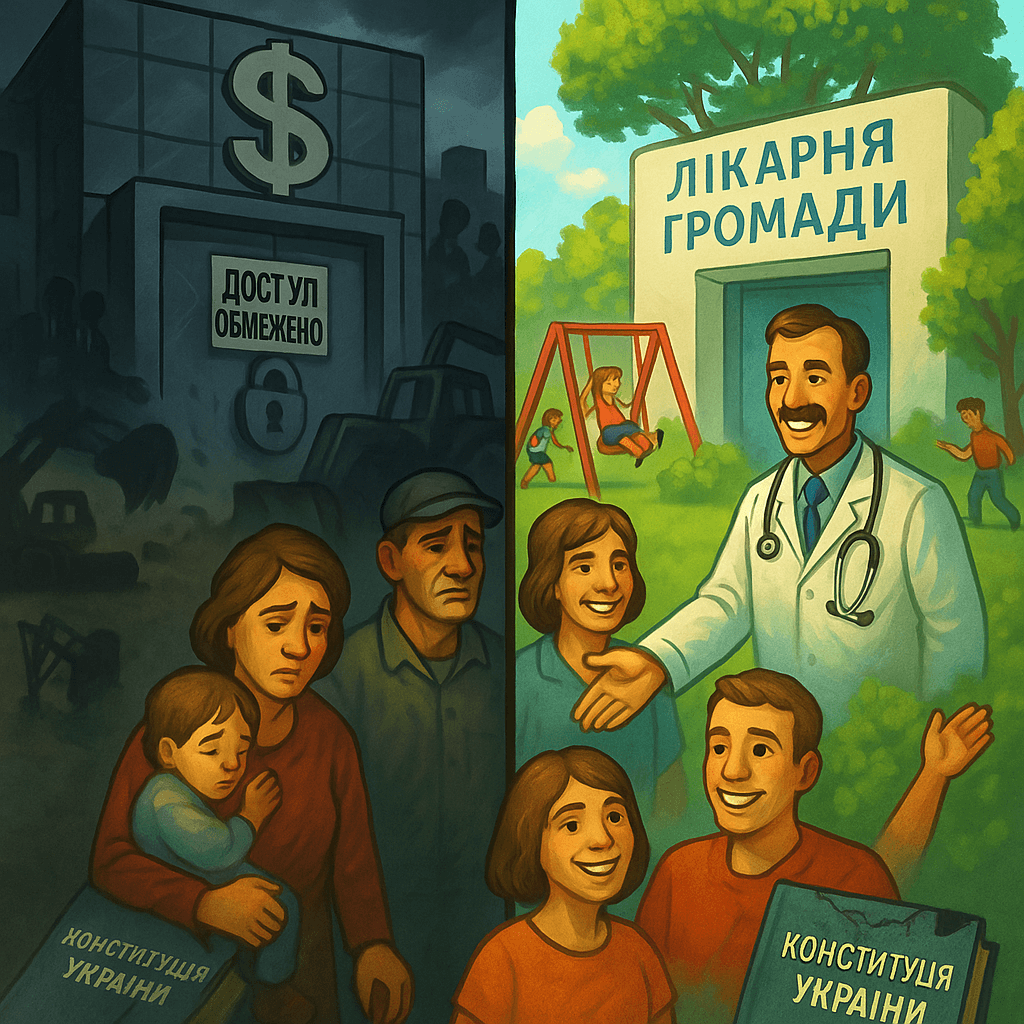When profit matters more than life: Are hospitals preparing for wealthy patients, disregarding the Constitution and common sense?

When profit matters more than life: Are hospitals preparing for wealthy patients, disregarding the Constitution and common sense?
An analysis of the new health care legislation gives grounds for serious concern. Under the slogans of “European integration” and “management optimization,” a law (formerly Draft Law №6013) is being advanced that establishes a legal framework for the full commercialization of public hospitals. The abolition of the Commercial Code and the introduction of new rules of the game from the end of August 2025 may turn the remnants of accessible medicine into a soulless business project, which contradicts both the guarantees of the Constitution of Ukraine and the principles of a social state.
Let us consider a hypothetical but entirely realistic scenario that illustrates the potential consequences of the reform. Imagine that your child needs an urgent operation. You call an ambulance, but it turns out that the emergency service has been “optimized,” and the responding team has no specialist doctor—only paramedics whose function is merely transportation to the hospital; as a result, the child could die en route without receiving qualified care. At the hospital turned into a business structure, the first question won’t be about the diagnosis but about your ability to pay. This scenario, sounding like a disturbing prediction, could become reality for millions of Ukrainians if the system’s priority becomes profit rather than health.
The current “reform” from the Ministry of Health/NSZU: a foundation for medical collapse.
The current situation clearly demonstrates the direction of movement. Transforming hospitals into municipal non-profit enterprises (MNPs) and the controversial “money follows the patient” model effectively creates a paradox. On the one hand, hospitals become interested in a continuous patient flow to secure funding, rather than in citizens’ health. On the other hand, with a high patient load, NSZU funds quickly run out, creating the risk of underfunding by year’s end. This leads to forced treatment refusals and, in the worst-case scenario, hospital bankruptcy followed by privatization or complete liquidation. Meanwhile, in the absence of a sufficient patient flow, hospitals become candidates for “optimization”—cutbacks and closure. Rebuilding destroyed infrastructure and human capacity will take years and enormous resources, and the cost of such a “pause” is human lives.
Instead of addressing these systemic problems, the state intensifies control, creating a bloated apparatus of officials whose salaries are incomparably higher than those of doctors. At the same time, the leadership of medical institutions transforms into a caste of managers with astronomical pay, while frontline medical staff receive meager sums.
Such meager salaries not only demean medical workers but also undermine the profession’s prestige. Young doctors and nurses, seeing no future, choose not to work in their field or even emigrate from Ukraine to countries that respect their work, provide decent conditions, and pay worthy salaries. As a result, Ukraine is already experiencing an acute shortage of medical personnel, leading to inhumane overloads for those who remain and save lives. Inhumane working conditions, multiplied by aggression from patients who do not receive quality care because often there’s no one or nothing to provide it, in fact drive the remaining specialists out of hospitals, closing this vicious circle.
Under these conditions, a reasonable assumption arises that the real purpose of the reform is not national health but cutting the budget and redirecting financial flows in favor of certain groups, even at the cost of citizens’ well‑being.
Legal analysis: Direct violation of the Constitution
The proposed changes are not only socially dangerous—they directly contradict fundamental norms of the Constitution of Ukraine.
First, the right to free medical care is violated. Article 49, Part 3 of the Constitution of Ukraine states clearly:
“In state and communal health care institutions medical care is provided free of charge; the existing network of such institutions cannot be reduced.”
Commercialization of hospitals, the introduction of “economically justified tariffs,” and reducing state guarantees to a narrow list of “free services” replace the meaning of this norm. The Constitution guarantees free medical care, not free services from a limited list.
Second, the community’s right to manage its property is being eliminated. Articles 140–143 of the Constitution and the Law of Ukraine “On Local Self-Government” grant territorial communities the right to independently manage communal property. Hospitals built and maintained with community funds are an integral part of community property. Turning them into business entities and transferring them into private management or ownership through opaque mechanisms (lease, usufruct, supervisory boards) deprives the community of genuine control over its assets. This is not just losing property—it’s losing a tool for carrying out public authority and caring for its residents.
Risk #1: From non-profit status to full-fledged business
The new legislation creates conditions for turning MNPs into full-fledged commercial companies (LLC, JSC) whose primary goal will be PROFIT, not public health. It paves the way for hospitals, driven to artificial or real bankruptcy through NSZU underpricing and fines, to be easily “transformed” or simply sold off cheaply to “effective private owners.”
At the heart of this scheme are supervisory boards that receive vast powers but often act as obedient instruments of those who appointed and control them. They will issue decisions not in the interests of the territorial community or patients, but for the benefit of enriching themselves and their sponsors.
Risk #2: Community control over public property lost
Today, hospital buildings, unique equipment, and the land beneath them are the community’s property. The new law introduces mechanisms allowing this property to be transferred into “lease,” “management,” or even mysterious “usufruct” by private firms. Who will decide? Bureaucrats with “discretionary powers,” which directly creates corruption risks! And let us be clear: in Ukraine, real corruption is not a hundred hryvnias of gratitude to a doctor for professional, hard, and responsible work. Real corruption is laws that allow officials to legally rob entire territorial communities. This law and the medical reform are examples of such legalized corruption.
Ownership is power. Transferring communal property into private hands is transferring power from the territorial community to corporations. By monopolizing essential services, a corporation overrides public authority. This risks a new feudalism, where citizens’ rights depend on their financial capacity.
Risk #3: The illusion of salvation called “insurance medicine”
When arguments in favor of the destructive reform run out, we’re offered yet another pretty fairy tale—insurance-based health care. But it’s the same deception. Insurance medicine has very little to do with medicine and nothing to do with real health care.
In essence, it’s just a financial contract aimed at maximizing profits for insurance companies, not patient health. Therefore, insurers are interested in two things:
- Working only with healthy people, since sick clients are losses.
- Minimizing payouts if an insured person still falls ill. This means providing the cheapest services, not those truly needed by the patient.
An insurance contract always contains many loopholes and force-majeure clauses (war, epidemics) that allow avoiding payouts. And most importantly: if, as a result of the “reforms,” hospitals simply no longer exist, what will an insured person do with their money? An insurance policy won’t replace a surgeon’s scalpel or an operating room. Essentially, insurance medicine is an additional tax on all funds directed at treatment in favor of financial intermediaries.
Alternative: A real reform in the interest of the community
Is there no other way? There is. A real reform is restoring public authority and communal and state ownership to the Ukrainian people. It is restoring citizens’ ability to manage their property in the public interest for the benefit of all.
One method to implement such reform is to create public-law entities—territorial communities and the state as full-fledged economic actors—owned, managed, and controlled by their citizens, and not by corrupt officials or deputies.
What does this mean in simple terms? Imagine that it is not individual hospitals that are enterprises, but the entire community—as one large association—that supports itself. It does not sell services to its members for profit; it provides benefits to them as its owners. Just as you do not sell yourself the right to use your own kitchen in your apartment for a markup, a territorial‑community owner will not sell its residents vital services at monopoly rates. Instead, it will supply them at a fair price, covering only actual cost and funds for modernization.
The community’s funding sources are primarily its own revenues: from effective management of land, utilities, and service provision (electricity, water, heat). These funds, often currently embezzled, should become the foundation of the community’s well‑being. Taxes and state subsidies should be only auxiliary tools.
This model implies comprehensive health care, where the focus is not on treating diseases but on creating conditions in which people do not get sick:
- Healthy environment: ecology, industrial safety, development of parks and squares.
- Healthy lifestyle: access to sports, promotion of healthy nutrition.
- Social protection: care for motherhood and childhood, support for the elderly, inclusion.
- Mental care: psychological support services.
- Prevention: comprehensive disease-prevention programs.
And only as the final element of this system—high-quality and accessible medicine for those who still need it.

Diagram of Comprehensive Health Care
The cost of silence – a trampled Constitution and a lost future
What is being pushed under the guise of “reform” is a path into the abyss. It is the commercialization of suffering and an attack on the constitutional right to life and health. Access to medicine cannot be a privilege of the chosen few. A nation’s health is not a commodity. And if society remains silent today, allowing the Constitution to be trampled once and for all, tomorrow may be too late. We need reform for people, not for wallets.